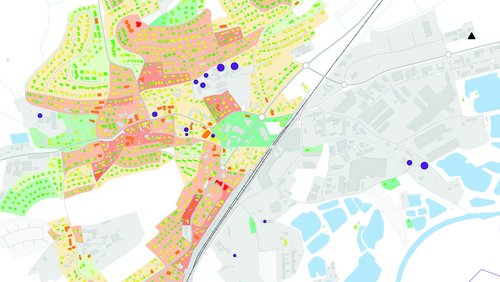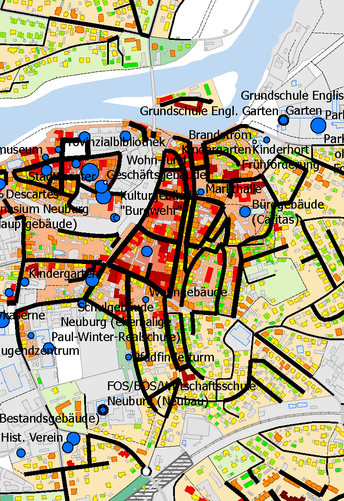Municipal heat planning for the town of Erbach (Donau)
bifa develops strategy and measures for greenhouse gas neutrality in the heating sector

Heat supply accounts for more than 50 % of total final energy consumption in Germany and is responsible for a large proportion of CO2 emissions. Around 80 % of heating requirements are still covered by fossil fuels such as gas and oil. The heat supply must essentially be considered on a local basis - which is why municipalities play an important role as local decision-makers.
Municipal heat planning is a planning instrument for the development of a renewable heat supply and is intended to support cities and municipalities. It is used to develop a locally appropriate approach to ultimately achieve a greenhouse gas-neutral heat supply under economic conditions. On the one hand, heat planning is a strategic process based on a transformation pathway; on the other, it derives specific, practical implementation measures.
Long before the German government's recent decisions on mandatory heat planning (Federal Heat Planning Act), the town of Erbach (Donau) put voluntary municipal heat planning on its agenda in 2022. The bifa Umweltinstitut was commissioned to draw up the plan.
Erbach has a good starting position
Several existing heating networks and heating network plans in the town centre and surrounding districts are helping to promote a sustainable heat supply. However, the options for action in neighbourhoods and districts not yet covered also had to be considered.
In an intensive participation process, the initial situation and options for action were clarified, a strategic approach developed and detailed measures worked out. It comprised interviews and five workshops with representatives of the local council, the municipal administration, energy suppliers, the regional energy agency, the district administration and Erbach companies. In the workshops, bifa provided support by preparing content and using targeted moderation methods.
bifa used geoinformation systems for the inventory and potential analyses. A multi-criteria analysis was also carried out to categorise settlement areas according to the feasibility of heat networks.
The central result of the study is a transformation pathway. In order to achieve the targeted reduction in greenhouse gas emissions by 60 % in 2030 (compared to 2021) and a climate-neutral heating sector in 2040, the use of oil and gas heating systems must be urgently reduced. Heating networks can generally utilise renewable energy sources more efficiently than individual house heating systems, but are not suitable for all settlements. Possibilities for a regenerative supply for all buildings in the urban area were identified. Measures for realisation were developed that can be implemented by the city administration and other stakeholders.
The project was funded by the Baden-Württemberg Ministry of the Environment, Climate Protection and the Energy Sector. The results were presented and discussed with Erbach's citizens at the end of November 2023. The bifa study is published on the website of the town of Erbach (Donau).
![[Translate to Englisch:] Placeholder](/fileadmin/_processed_/f/4/csm_Header_Presse_d565a61df7.jpg)

